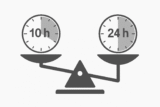Intermittent fasting, aka. time-restricted eating, not only helps with weight loss but also improves brain health and promotes longevity. If ...
This week’s SNAP crisis is just a preview. Tucked inside the giant tax-cut and spending bill signed by President Donald Trump this summer are enormous cuts to ...
.lightweight-accordion { border: 1px solid #ccc; border-radius: 4px; margin: 10px 0; } .icon-container { display: flex; ...
.lightweight-accordion { border: 1px solid #ccc; border-radius: 4px; margin: 10px 0; } .icon-container { display: flex; ...
.lightweight-accordion { border: 1px solid #ccc; border-radius: 4px; margin: 10px 0; } .icon-container { display: flex; ...
.lightweight-accordion { border: 1px solid #ccc; border-radius: 4px; margin: 10px 0; } .icon-container { display: flex; ...
中文 Tiếng Việt .lightweight-accordion { ...
Unless a product is labeled as using 100% natural oils, then it's full of chemicals that are harmful, or even toxic to you and your family. The main culprit is ...
Sleep! Yes, really. Most people underestimate the power of a good night’s sleep, thinking of it as a luxury rather than a priority. Yet, science shows that ...
Today’s guest proposes that awe is an emotion that’s all around us, waiting to be discovered – and in doing so, we can begin to transform our health and lives ...
.lightweight-accordion { border: 1px solid #ccc; border-radius: 4px; margin: 10px 0; } .icon-container { display: flex; ...
.lightweight-accordion { border: 1px solid #ccc; border-radius: 4px; margin: 10px 0; } .icon-container { display: flex; ...
- 1
- 2
- 3
- …
- 572
- Next Page »




